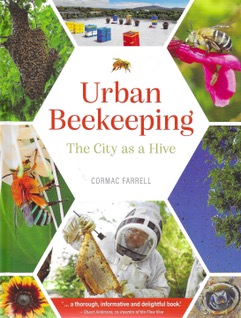Book Review:- “Urban Beekeeping”, subtitle “The City as a Hive” by Cormac Farrell, published by Exile Publishing, price $59.99. Reviewed by Tony Orman
The author Cormac Farrell is an environmental scientist and beekeeper for the Australian parliament, managing several apiaries and orchards throughout Canberra. His dual roles of environmental scientist and beekeeper gel together neatly as bees vital to the larger ecosystem are under threat.
The author writes “The one thing that all bee species are dependent on is abundant flowers that are free from pesticides.” To be a successful beekeeper this has to paramount in the thinking.
“One of the central conceits that beekeeping explodes is the idea that mankind is somehow superior to the other creatures on this planet, that other creatures are expendable in our quest for development, profit, life in general—we are the expendable ones, and it is plants and their pollinators, soil microbes and detritivores that are really the critical part of life on Earth.”
Cormac Farrell express the wish that his book should be a part instruction manual for urban beekeepers and part manual for city planners, governments and citizens in creating a more sustainable way of life. He succeeds admirably as he takes the reader through the process of creating a thriving urban hive. He adeptly covers topics such as the various bee species (did you know there is over 20,000 bee species world wide?), setting up an apiary, planting to feed your bees, diseases such as varroa, different hives ands how best to utilise them and building a relationship to your bees and managing the hive.
Honeybees are just one of the estimated 20,000 bee species that inhabit the planet.
Yes it is a manual for beekeepers and gardeners but it’s also a heart felt plea to modifying the concept of cities and towns to embrace more of the natural word, especially bees.
It’s an absorbing read whether you want to get into beekeeping or care about the environment and the functioning of the natural world.



Albert Einstein is supposed to have said – “If the bee disappears from the surface of the Earth, man would have no more than four years left to live.” Bees are vital.
Without bees, humans couldn’t survive. According to WWF, out of three mouthfuls of food we eat, one relies on bees’ busy work. It sounds lie an interesting book with a very valid message.